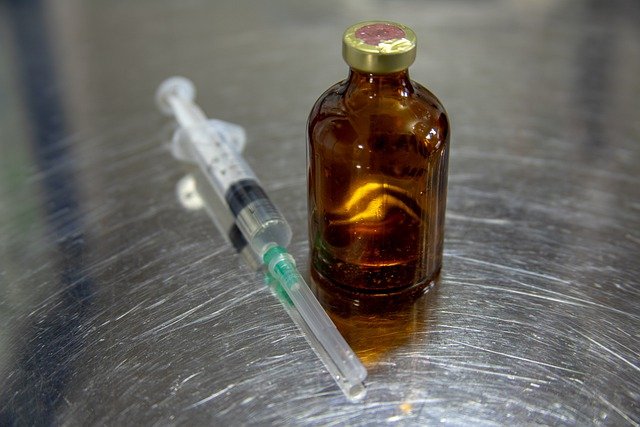If you're like many first-time puppy owners, you are probably not familiar with essential vaccines that canines require at a young age. You'll also find this article beneficial if you're here for refresher information on canine vaccines. Here, we'll discuss what vaccines puppies need, the types, their purposes, costs, and other details you may need to know about dog vaccines.
Table of Contents
Vaccines For Puppies: Types
Even though it takes some effort to keep track of a dog's vaccines/boosters and follow-ups, they remain highly essential and worth the work. Vaccines protect our puppies from preventable but potentially harmful infections and diseases. Without vaccines, our dogs can quickly become ill and die from these diseases. In this section, I'll discuss some of these diseases/infections and their vaccines.
Canine Distemper
This highly infectious disease commonly attacks animals' respiratory, nervous, and gastrointestinal tracts. It is airborne and can be transmitted through sneezing and coughing and from sharing food and water bowls.
Some of this infection's typical symptoms include nose and eye discharges, hardened pad, fever, coughing, vomiting, diarrhea, and seizures. Some infected animals may also show signs of paralysis and twitching. In some severe cases, canine distemper can lead to death. While there is no cure for distemper, infected dogs can be cared for, and the symptoms controlled to prevent death and reduce symptoms like seizures.
Bordatella Bronchiseptica
Another highly infectious canine disease, Bordatella, is often marked by severe coughing, vomiting, and in some cases, seizures and death. It is also a common cause of kennel cough. Thankfully, however, it can be prevented with injectable and nasal spray vaccines.
Heartworm
As the name suggests, heartworm is a condition whereby worms lodge at the heart's right side and the pulmonary arteries. In some cases, these worms travel around the body and grow up to 14 inches long, attacking vital organs like the liver and kidneys.
While new heartworm infections barely show symptoms, they can cause lethargy, appetite loss, and breathing problems in the late stages. You may also notice the dog show signs of exhaustion after only mildly-stimulating activities. Mosquitoes transmit heartworm.
Kennel Cough
Kennel cough occurs from the inflammation of the upper airways and may be caused by a viral bacteria Bordetella or any other infection. The condition commonly involves multiple diseases and is marked by dry, harsh coughing that can become severe to the point of gagging and poor appetite. It spreads quickly in areas where dogs are kept together, e.g., dog shelters.
Rabies
A common viral disease, rabies attacks the central nervous system of infected animals. Common symptoms of rabies in canines include hallucinations, anxiety, headaches, foaming, drooling, paralysis, hydrophobia, and death. Rabies usually become fatal unless the infected animal is treated within hours of infection.
Canine Infectious Hepatitis (Adenovirus)
This infectious disease attacks the canine's liver, kidneys, lungs, spleen, and eyes. Even though they share the same names, canine hepatitis is different from human hepatitis. This infection's symptoms include congestion of mucous membranes, slight fever, vomiting, jaundice, pain around the liver, and stomach distention. While infected dogs often bounce back from the mild infection, severe cases may lead to death as it has no cure, and only the symptoms can be treated.
Other common canine diseases include canine parainfluenza, coronavirus (different from COVID-19), leptospirosis, parvovirus, and Lyme disease.

Puppy Vaccination Schedule
Usually, the first puppy shots are given around their 6th to 8th week of life. After this stage, new vaccines and boosters are given every 3 – 4 weeks until they are about 16 or 17 weeks old, and some require boosters at around the 20th week. While vaccines are often mandatory for all canines, the schedules and types are not necessarily the same for all. Certain factors such as a puppy's age at the time of adoption (or purchase), pup's mother's vaccine and immunity status, environment, the intended lifestyle, region, and past vaccines can influence your vet's recommendations.
PUPPY'S AGE RANGE | CORE VACCINES | NON-CORE VACCINES |
|---|---|---|
6 – 8 weeks | Parvovirus, distemper | Bordetella |
10 – 12 weeks | DHPP (for adenovirus, distemper, and hepatitis), parvovirus, and parainfluenza | Bordetella, influenza, leptospirosis |
16 – 18 weeks | DHPP, Rabies | Lyme disease, influenza, leptospirosis, Bordetella |
12 – 16 months | DHPP, rabies | Coronavirus, leptospirosis, Lyme disease, Bordetella |
DHPP | Influenza, coronavirus, Lyme disease, leptospirosis, Bordetella | |
Rabies (following region or state laws) | None |
Between Core Vaccines and Non-Core Vaccines
You may have observed that the vaccines are classified into core and non-core types in the table above. Here, I'll explain the difference between both vaccine types and why vets may sometimes recommend non-core.
Core Vaccines
Core vaccines are recommended or made mandatory for highly infectious, potentially fatal, and possibly debilitating conditions. These conditions can also easily spread from canines to humans. Hence, they are considered "mandatory" to protect both pets and humans from infections regardless of their locations, living conditions, and lifestyle.
Non-Core Vaccines
These vaccines may be recommended in specific geographic locations (places where the particular disease is common) or are less severe or with certain lifestyle risk factors. While they are essential, they are not needed or recommended for all canines.
Cost of Canine Vaccines
Vaccine cost can depend on several factors, such as your living area (rural or urban?) and type. Regardless of costs, certain core vaccines are mandatory.
On average, both core and non-core vaccines should cost around $70 - $100. If you adopted your dog from the shelter, it might already be up to date on the vaccines. You only have to continue where they stopped, which means less money to spend on vaccines.
Generally, dog vaccines cost more at the puppy stage/first year of your dog's life than after. Even then, they are still not too big an expense to ignore. And even if you decide to buy a dog past the puppy stage, keep in mind that the vaccination costs are also factored into the purchase price, so either way, you still pay.
Do Canine Vaccines Have Side Effects?
Aside from too many vaccinations posing health risks to your dog, vaccines can sometimes affect our canines adversely, just like in humans. Some dogs may experience drowsiness or even feel sick after getting some shots, while others experience no side effects.
If you have concerns, ask your vet about possible side effects of any vaccine and ensure you watch your pup closely for at least 24hrs after every immunization. If you notice any unusual reaction after a vaccine, treat it as a medical emergency and immediately contact your vet.
After Vaccines, What Next?
While vaccinations protect your puppy against infections it may come across, it can still go outside even before the full course has finished. However, you want to keep it away from as many new things or places as possible before getting fully vaccinated to reduce the risk of contracting a disease.
You want to help your dog become a well-rounded adult at this puppy stage by allowing it to socialize even as you try to keep it safe from infections. Remember that when dogs are kept away from the outside world for too long, they develop behavioral problems that could be hard to deal with later.
Vaccinations for Adult Dogs
Although some dog handlers believe that grown dogs should be vaccinated yearly, many do not. The latter group believes that excessive vaccinations are unnecessary and sometimes harmful because of the health risks they pose to your dog.
In the end, your dog's immunity level and your vet's recommendation are all that matter. Discuss this with your vet, so you have the most suitable vaccination plan drawn out for your dog.
To know your dog's immunity level before annual shots, request for titer tests. These tests determine which, if any, vaccinations are needed at the time. However, you do not need a titer test with rabies vaccines to do it, as it is mandatory in the United States and many other countries.
Vaccines for Puppies: Conclusion
Puppies and grown dogs require the best care possible, and staying up to date on their vaccines remains one of the ways you show that you care for your dog. Only a healthy dog can reward you with love. Getting your dog vaccinated does not cost too much, so be sure to stay on top of the core ones and the "non-core" ones. Also, keep your dog updated on booster shots if and when needed. If you travel a lot with your dog or let him spend time outdoors, you want to be extra vigilant about the vaccines; core and non-core.
Finally, keep your dog safe from infections before the vaccines, especially if you live in a high-risk area, and prevent human contact with dogs with suspicious symptoms. Treat any unusual symptom with urgency and have a vet check your dog and, if possible other pets if you suspect an infection. While many of these diseases are potentially fatal, early detection and care remain crucial for their survival.
About the Author
Kirsten Heggarty
Kirsten created The Pet Handbook with the aim of sharing her knowledge about pets, pet food, healthy habits, and more. All of her advice is based on years of her own experience with her pets, and feedback that she has received from grateful readers about her tips. If you want to know more please read the About Me page.









